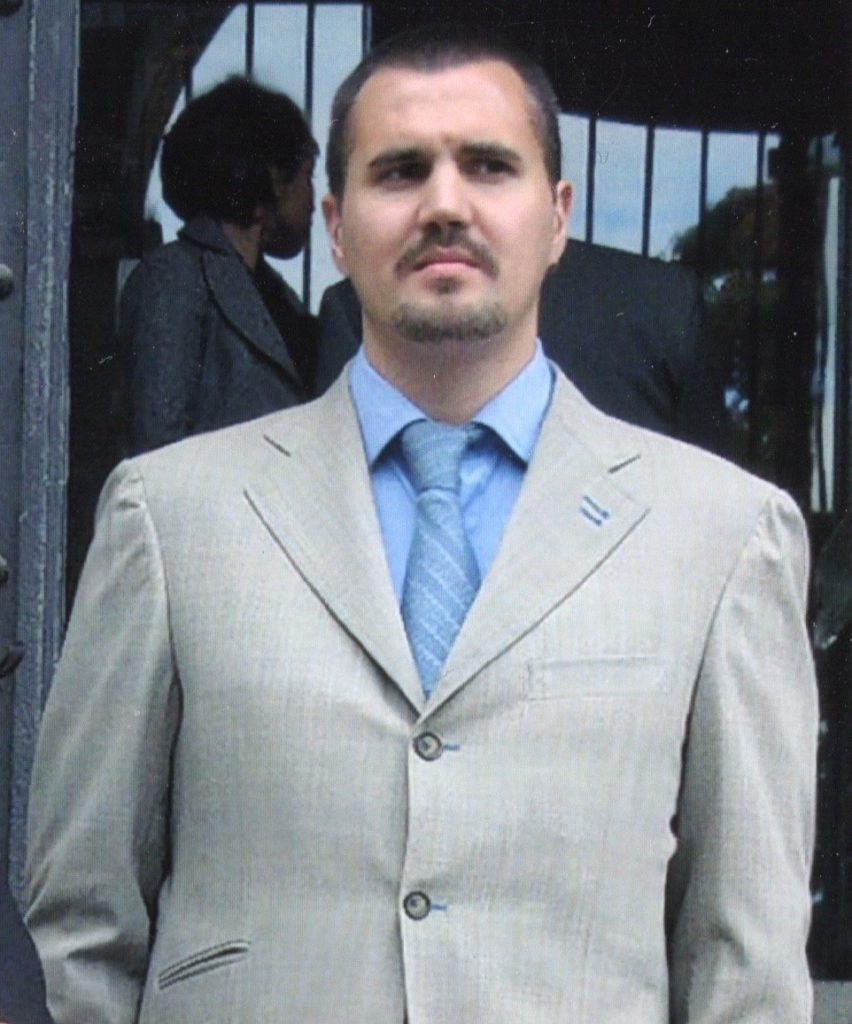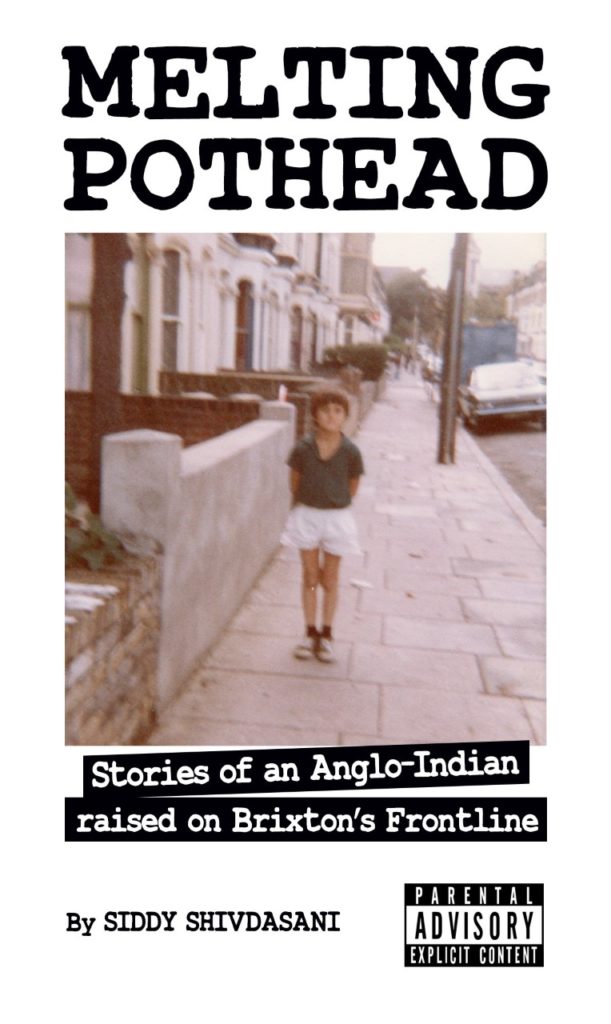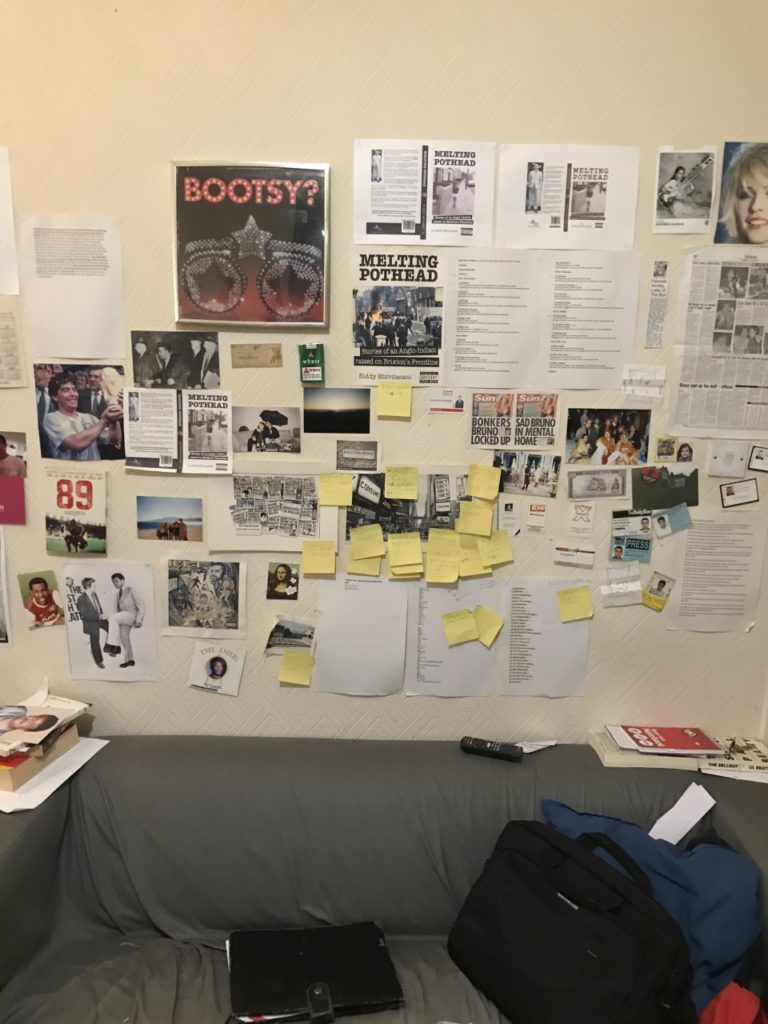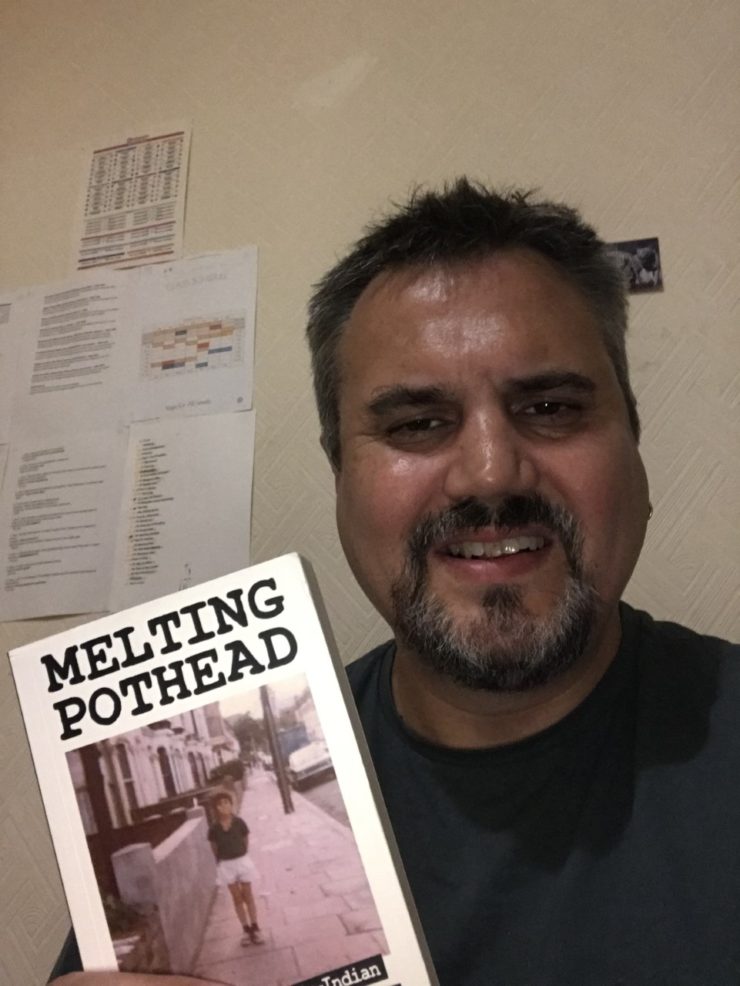It is with great sadness we announce the death of Siddy Shivdasani, aged 51. Siddy returned to journalism on the Sun after becoming a Mosaic Clubhouse member. He started his career with the South London press and captured his life in his powerful novel, Melting Pothead: Stories of an Anglo Indian raised on Brixton’s frontline. We featured Siddy’s story in 2020, which can be revisited below, as well as the moving tribute from Lee Elliott, Mosaic’s Coordinator – Employment, Information and Training who described Siddy’s story as a ‘life affirming tapestry’. You can read the Sun’s obituary here
https://www.thesun.co.uk/news/23335106/former-sun-journalist-siddy-shivdasani-dies/
A bipolar mind: beyond mental illness
by Siddy Shivdasani
Foreword
Mosaic Clubhouse is privileged to be part of Siddy’s recovery story. In fact, it’s more true to say that Mosaic Clubhouse positively benefited by being part of his story, most recently through the journalism course he organised but more powerfully through his determination to turn lemons into lemonade.
From the start, Siddy presented as a determined and resilient person (thank you, Siddy, for all your help with inputting our data in those days!) while clearly battling against the painful impact of his mental illness.
When, within less than a year of starting his membership at Mosaic Clubhouse, Siddy returned to work at News of the World, I recall being impressed and concerned in equal measure. Impressed at the speed with which he’d relaunched his career and concerned at the obstacles the road might present. I needn’t have worried. Siddy’s book, ‘Melting Pothead’, demonstrates that he’d never actually stalled his career in the first place. He’d woven all the lessons that life had thrown at him, from being sectioned and suffering the stigma of mental illness to the birth of his daughter and his eventual marriage break-up into a life-affirming tapestry.
The candour with which Siddy describes his experience of mental illness, and the validity he affords it in his subsequent success, makes for a deeply human story of recovery and a real inspiration.
Lee Elliott, Mosaic Clubhouse
I don’t like to dwell on what I went through in the summer of 2008 and the following few years.
I’m not going to go into detail about all the terrible things that happened but sometimes it’s worth me recalling to myself that period just to prevent a repeat. I have bipolar 1 and my brain went to war with itself. I was sectioned on three occasions inside two years.
Being locked up so much in such a short space of time had pointed to the probability that I’d become a so-called “revolving door patient”. But it didn’t work out that way and I am turning into a success story. A success story for Mosaic Clubhouse.

Somehow, I’m in good shape 12 years on. My eight-year-old daughter is the centre of my world. I’ve been out of a bad marriage for over five years. And my hard work in journalism has paid off to the extent that I can have a “portfolio career”, permitting me to see my little girl grow up.
I began my career in earnest aged 23 in 1994 on British-Asian newspaper Eastern Eye. I left The Sun for the second and last time in 2016. In other words, I’m not going back.
I have recently published a book — MELTING POTHEAD: Stories of an Anglo-Indian raised on Brixton’s Frontline — which features how mental illness and racism have impacted me.
But although those subjects are key elements, a lot of it is entertaining and even fun. There are certainly some decent anecdotes. One of my close friends and former colleagues said: “Of course it’s interesting, it’s about your mind.”
I should point out that my book is not in any way a study of bipolar (although my experiences in that area are tackled directly in sections) but it’s all an insight into a bipolar mind. I don’t have an academic background and there is little academic or objective about my book.
It’s a similar story on race. An overwhelming number of people of all colours have wanted to get involved in the Black Lives Matter movement since the murder of George Floyd in the US this year. My book was largely produced when that happened but I think a lot of what I’ve written is still relevant.
Books such as Why I’m No Longer Talking To White People About Race (which I quote a handful of times in my book) and White Fragility begin to cover essential reading on the academic side. MELTING POTHEAD, meanwhile, certainly isn’t core to the curriculum.
I like to think I offer something a bit more intuitive on race.
Born in 1972 out of what was then a taboo — as in being mixed race — has been a challenge. Growing up in Brixton, south London, has made racism a cause for me and I like to believe I’ve done a lot of good work in that subject area. But nothing prepared me for the stigma of mental illness.
Now I’m determined to make it one of my causes as well because I feel a deep sense of commitment to fellow sufferers and, crucially, have the tools to fight that stigma. It can start from within your close family and circle of friends.
Certain aspects of the NHS mental health system get tiring. The “human discharge-proof” furniture is an irksome example. But what’s really hard to swallow is being respected within newsrooms and then patronised, even bullied, by arrogant healthcare professionals, sometimes on the same day.
Of course, there are good and great people within the NHS and the wider care system. In MELTING POTHEAD, I describe my first experience of being in a mental health unit: “Inside a few months, I went from needing a dozen cops to subdue me to struggling to walk for more than five minutes.
“Some of the staff were total arseholes and some of them were wonderful. There seemed to be little in between at Goodmayes [psychiatric hospital]. However, one nurse will always stick out in my mind.
“He was the lowest in the hierarchy and had been in the job for decades but his kind soul motivated me to build up my strength with short walks, increasing bit by bit. This [Middle Eastern] middle-aged man never made a show of that kindness but I owe him a great debt.”
After returning to south London around 2010, my (lovely) case worker referred me to Mosaic Clubhouse because, in her words: “Life is just passing you by.”
I spent my time inputting to a digital register of members who had work placements. It was tedious but it did start to give me a sense of purpose, which had been sadly lacking for years. Still, writing headlines for national newspapers seemed like something from a different life, a life lost forever.

Mosaic Clubhouse wasn’t meant to be fun with dancing girls and complimentary pina coladas, I get that. The best thing was meeting staffer Lee. I actually didn’t have much personal interaction with him early on but I observed him and was very taken by the way he interacted with the members.
He wasn’t at all patronising and his patience seemed effortless. I saw him as a humanitarian and that’s why I nominated him as my point of contact worker.
It was a massive achievement to resurrect my career as a sub-editor later in 2010, at the News of the World. But it folded less than a year later and I felt I had to go back to The Sun in 2011, which I didn’t really want to do.
I had stopped coming to Mosaic Clubhouse at that point but it had played a major role helping me turn the corner. And Lee would occasionally come and have a coffee with me near my home in West Norwood, south London, or Wapping, east London, where the papers were based.
To tell the truth, I felt like there must have been more deserving cases than me. But looking back, it was good. Good to have someone monitor my return route to sanity and strength. And good to know there was someone qualified having an overview of my recovery.
I’m convinced my condition has played a key part in my success as a journalist. My obsessive streak, for instance, is a vital attribute in the art of headline writing.
I like the idea of coming up with one which can’t be topped for the story in question. But I suffered for my art. Sometimes I’d spend days trying to come up with a better headline than the one published, often succeeding, which brought its own frustrations. But that desire to constantly improve gave me an edge.
I enjoyed writing headlines and had friends at The Sun but the workload and politics got a bit extreme and I took voluntary redundancy in 2016. For months on end, I just slept and slept. I was also processing my dad’s death and didn’t want to get back into journalism.
At one point, I came within an ace of working at a local grocery store. Thankfully, I didn’t.
Eventually, after getting the urge to write again, I started to pen a feature about my racial perspectives as an Anglo-Indian growing up on Brixton’s Frontline. But nobody wanted it.
However, I seemed to make a number of breakthroughs during my interactions over the relevant issues with the many creative people in my life and I realised I potentially had a book on my hands.
Unfortunately, the Department for Work and Pensions didn’t see it that way. They insisted on me doing an hour a week of “work-related activity”. Anything. Mosaic Clubhouse sprang to mind and I contacted Lee.
I thought I’d turn up, sign in, smoke fags out the front for an hour and sign out. But Lee had other ideas. I wrote in MELTING POTHEAD: “I started holding journalism workshops at Mosaic Clubhouse. It had changed location from Streatham to [nearby] Brixton and the new site was much better.
“I enjoyed empowering people. I planned out each session in detail with notes and a homework task. The biggest challenge for me was that the ability levels and behaviour patterns ranged across the spectrum.
“But these people are mostly patient with each other and my strategy of being open about my mental illness seemed to put them at ease. I didn’t patronise them and wasn’t afraid to keep things moving. When I was firm, I did it in a respectful way.
“Every now and then, I got a rewarding moment, whether it be by something submitted or just a good observation by one of the students during the sessions. It’s nice to give something back and it was so good for me to have a sense of purpose, rather than just trying to survive in a vicious, toxic newsroom.”

Then a sequence of events turned things on their head yet again. I was in contact with the editor of Metro.co.uk and I was doing a (tedious) trial shift at The Independent in the same, massive Kensington office building.
I managed to grab the Metro.co.uk editor outside for ten minutes and persuaded her I could help to raise, even revolutionise, writing standards in her operation. Cutting to the chase, it worked out and I ended up getting regular, part-time, freelance work.
The funny thing was that I adapted the Mosaic Clubhouse workshops course material by simply stripping out stuff that wasn’t relevant to Metro.co.uk and building around what was left. The scheme was going well and then…lockdown. It will restart when life gets back to the “new normal”.
One of few positives about lockdown was that I could give more attention to producing and, eventually, publishing MELTING POTHEAD. A box full of promotional paperbacks shipped from India seemed a good reason to hook up with Lee again and present Mosaic Clubhouse with a signed copy.
So what now? I’m involved with a TV documentary about the 1999 London nail-bombing campaign. As editor of British-Asian newspaper Eastern Eye at the time, I was the most high-profile journalist in the country over that horrific few weeks.
I have been filmed and interviewed for the programme and will be the ‘journalist voice’ on events. It will be finished in October, although I don’t know when it airs. But I’m hoping it will attract lots of attention for my book.
Making money was never the driving force behind writing MELTING POTHEAD and it still isn’t. It’s a labour of love, tied into a fierce determination to have my voice heard.
There’s a lot more to me than race and bipolar, although the latter is still a daily struggle. I always say, though, that it doesn’t define me. But mental illness will always be part of who I am. Thankfully, there are people and organisations out there to help sufferers lead a full life.
You just need to know where to look.
Check out my website — meltingpothead.com — for free chapters, examples of my other work, more about my life, and purchase details.
Here are a few links to the coverage of my book:

